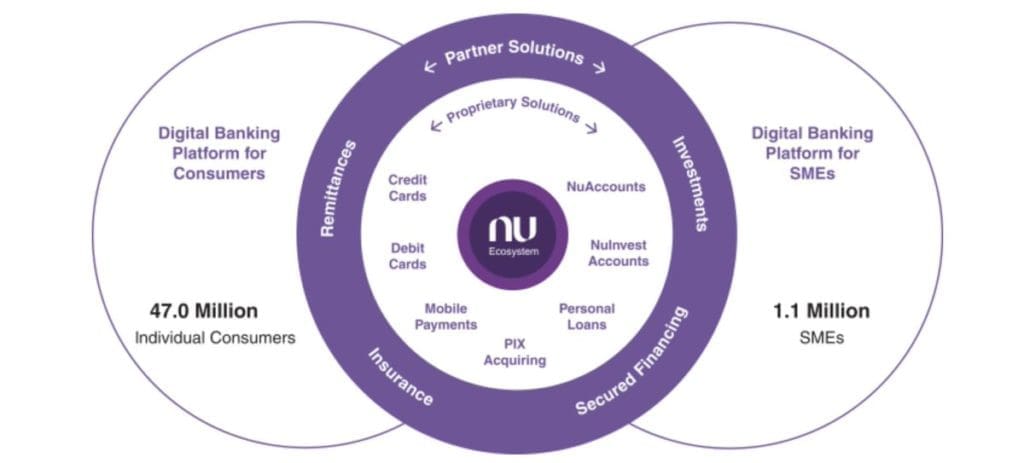That did not take long — Nubank officially filed an F-1 to go public Monday, a form for foreign issuers of securities.
The Brazillian digital bank revealed it targets a $50 billion valuation, based on 48.1 million users in Q3, adding 2.1 million a month.
Miguel Armaza, co-founder and MD of Gilgamesh Ventures, has injected millions into LatAm Fintechs and said the lofty valuation of Nubank is no surprise.
“Nu’s valuation is not crazy,” Armaza said. “In fact, they are valuing each customer at about $1,000, whereas U.S. and European neobank valuations put their customers closer to $2,000.”
Nu has no signs of slowing down in the near term, Armaza said, pointing out that the challenger is adding 2 million customers a month, and nearly half (48%) use the app daily.
“I don’t see their near-term growth slowing down.”
At those numbers, Nubank is the largest digital bank globally by customer count, with 35.3 million — more than 70% of Nubank customers — active monthly.

The firm draws new users from a large unbanked population in Latin America, notably Brazil, Mexico, and Colombia.
The filing stated Nubank had supplied more than 5.1 million users with their first-ever bank account or credit card and more than one million Small to Medium-sized Businesses (SMBs.)
“As of Sept. 30, 2021, we had 48.1 million customers, including approximately 28% of the population of Brazil aged 15 and above… For the nine months ended Sept. 30, 2021, our [Customer Acquisition Cost] was $5 U.S. per customer,” the filing stated.
Room for growth
Such a low cost leaves a lot of room for growth, especially compared to other Brazillian banks, Armaza said.
“For comparison, the average [monthly] revenue per customer for Brazilian incumbents is $20, and Nu is only at $5,” Armaza said.
“Nu might not get to $20 since they are not gonna charge crazy high fees, but there’s definitely more value left to be unlocked from their customer base.”
“Additionally, should their number of new clients slow down, they have ‘permission’ from their customers to provide more services,” Armaza said.

The document, which reads like a victory parade for a fintech success story, stated plans to expand products in five “seasons” of a customer’s financial journey.
Nubank offers products like Spending through credit and debt and mobile payments; Savings with Nu personal and business accounts; Investing with NuInvest, Borrowing with Credit and personal loans; and Protecting through insurance.
“In mid-2012, I entered the branch of one of Brazil’s largest banks to open my first Brazillian bank account; As I approached the first bulletproof door that armed security guards flanked, I sensed this was not going to be easy,” co-founder David Velez wrote in an introductory letter.
After months of headaches to open a bank account, Velez wrote that he decided to solve the banking inclusion problem as an entrepreneur.
After eight years, Velez will become the richest Colombian in history when the stock launches.
“Latin America is a region of over 650 million people and has the potential to be one of the most powerful economic engines in the world.”

Velez owns stake worth $10B
Velez, Christina Junqueira, and Adam Edward Wible will hold 87% of the votes and a fourth of outstanding stock at launch. The 40-year-old Velez owns a stake worth about $10.4 billion at the target IPO price.
According to the World Bank, LatAm has a financial service market of $1 trillion a year, and an estimated 135 million in Brazil, Colombia, and Mexico alone are unbanked.
Despite the surprising numbers in customer acquisition and scale, Nubank reported it has run at a loss for the past three years, losing $171 million in 2020 but posted a $505 million gross profit in the past nine months of 2021.
The Nu ecosystem aims to sell 289 million shares at $10-$11 per share to raise $3 billion from stock investors, the third-largest U.S. IPO this year. According to Yahoo Finance, the stock should be priced by Dec. 8 and go live soon after on the NYSE.
When thinking about foreign stock IPOs, it is hard not to remember Ant Group’s ill-fated launch that never was after regulators at home in China pulled back the leash.
However, given the pro fintech regulatory environment in South America, this will not be another Ant Group Armaza said — expect no sudden pullbacks, this unicorn is ready for the big leagues.
“Brazil and Mexico’s regulatory environment is very pro-fintech, and the government encourages financial inclusion initiatives and has passed attractive pieces of legislation.”
“This is a very different situation than Ant Financial in China.”


